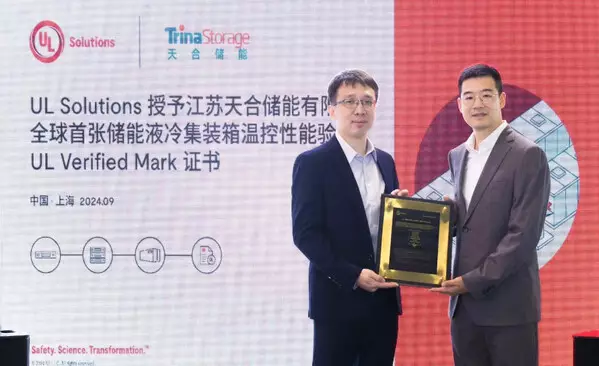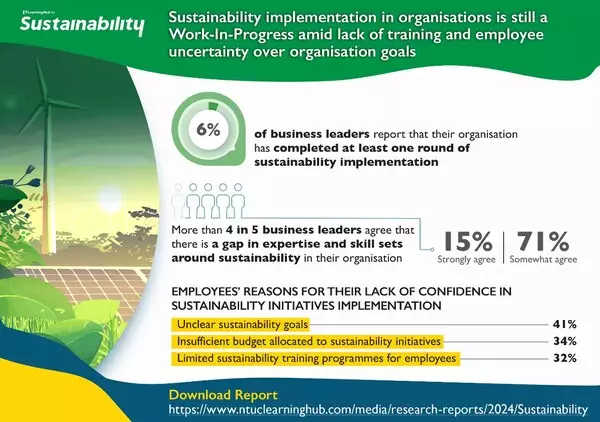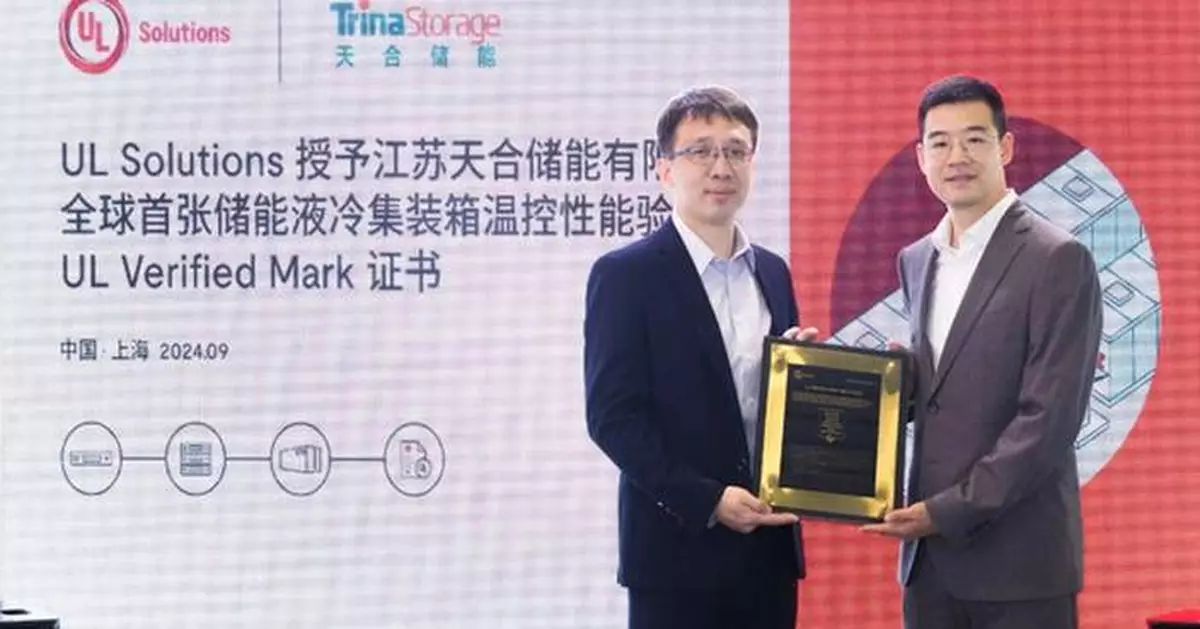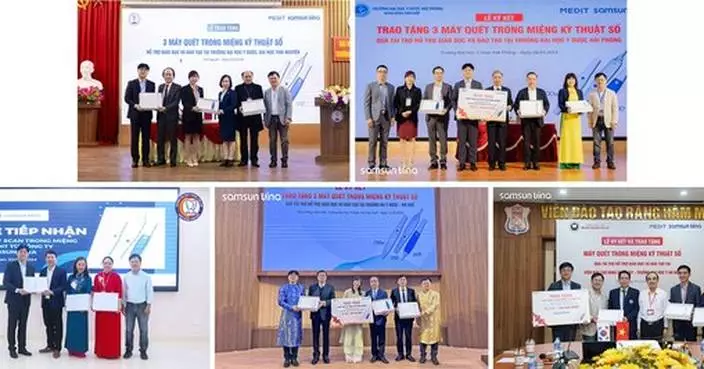MUNICH, Sept. 17, 2024 /PRNewswire/ -- On September 3, Trina Storage proudly achieved the world's first UL Verified Mark certificate for thermal performance of its liquid-cooled energy storage containers, issued by UL Solutions, a renowned global certification authority. This accolade highlights Trina Storage's innovative prowess and the global recognition of its product quality in the energy storage industry.
UL Solutions conducted comprehensive testing on Trina Storage's liquid-cooled containers, evaluating factors such as temperature control precision, heat exchange efficiency, system stability, and durability. Trina Storage's containers excelled across all tests, showcasing exceptional efficiency and stability even under extreme conditions. Leveraging cutting-edge liquid cooling technology, Elementa liquid-cooled containers effectively manage the heat generation during energy storage operations, ensuring stable and safe battery performance.
In terms of technological implementation, Trina Storage integrates advanced design features into its flagship product, Elementa 2, including multi-modal chillers, heat transfer and conduction structures, pipeline flow topologies, and dynamic temperature control strategies.
NTC temperature sensors are strategically placed across the entire battery cell surface, ensuring comprehensive and precise temperature monitoring. During the temperature control performance verification, battery surface temperatures were monitored throughout the charging, discharging, and resting phases. Real-time monitoring of these processes revealed a temperature variation of less than 2.5°C, achieving consistent compartment temperature and system thermal stability.
Furthermore, the thermal management technology demonstrated outstanding performance in pipeline flow uniformity and liquid cooling plate consistency, with all test results meeting design standards. Compared to traditional cooling methods, Trina's thermal management strategy extends cell lifecycle by 10%, providing strong assurance for the long-term stability of energy storage systems.
The Verified Mark certificate awarded to Trina Storage was granted after UL Solutions' stringent testing and verification processes, ensuring the authenticity and reliability of the thermal performance of Trina's liquid-cooled containers.
Trina prioritizes technological innovation and product reliability, with multiple products certificated by UL. This latest temperature control performance verification by UL Solutions further underscores Trina Storage's expertise and dedication to maintaining high standards in energy storage technology.
Trina Storage, as a global leader in energy storage products and solutions, is dedicated to transforming the way we provide energy. Going forward, Trina Storage will continue to adhere to an innovation-driven development philosophy, consistently exploring and developing more efficient energy storage solutions.
** The press release content is from PR Newswire. Bastille Post is not involved in its creation. **

Trina Storage Earns the World's First UL Verified Mark Certificate for Thermal Performance in its Elementa 2 Liquid-Cooled BESS Cabinets
SINGAPORE, Sept. 19, 2024 /PRNewswire/ -- Although sustainability is a growing business priority, only 6% of business leaders report that their organisation has completed at least one round of sustainability implementation. This is in comparison to 14% from NTUC LearningHub's Special Report on Sustainability 2022. Nevertheless, a positive outlook remains as nearly three quarters of business leaders (72%) share that their organisation will begin its sustainability journey within the next five years or more, marking a 6% increase from the 2022 report.
Employees perceive possessing the knowledge and skills necessary to understand and implement sustainability initiatives at the workplace (6% to a large extent, 55% to a moderate extent, 34% to a small extent). However, more than four in five business leaders (15% strongly agree, 71% somewhat agree) say that there is a gap in expertise and skill sets around sustainability in their organisation where they seek skills like climate change sustainability (30%), environmental management system framework or policy (29%), risk management (29%), sustainability risk and impact assessment (29%), and Environmental and Social Governance (28%).
These are some of the key findings from NTUC LearningHub's Sustainability for Business Resilience Report 2024, which investigates sustainability as a business imperative, the current state of sustainability efforts in organisations, and the critical role of training and certifications. Based on survey involving over 150 business leaders and 350 full-time working professionals, the report also highlights the in-demand job roles and skills that inform and shape individuals' career progression while strengthening the business' resilience.
While nearly a third of business leaders (30%) report having sent their employees for sustainability-related training in the past year, only one in ten employees (11%) report attending sustainability-related training and about half (46%) are unaware of the available programmes in the market. This occurs while both business leaders and employees express similar concerns over training.
When sending employees for training, business leaders grapple with employees being too busy with work to attend training (43%), difficulty in identifying industry-recognised courses (39%) and relevant external training providers or centres (32%), insufficient budget for training programmes (36%), and resistance to change among employees (35%). Meanwhile, employees cite being too busy with work to attend training (43%), training programmes not being fully funded by their company (29%), having no one to cover their work while they are away for training (28%), uncertainty about their skills gaps (28%), and limited in-house training programmes offered by their organisation (27%) as key challenges.
Although nearly four in five business leaders (17% strongly agree, 63% somewhat agree) agree that their organisation has clearly communicated how employees can contribute towards the organisation's sustainability goals, both groups have differing views on the top motivators for sustainability initiatives implementation. Employees report the top three motivators to be cost savings (46%), complying with rules and regulations (44%), and responding to market demand (36%). On the other hand, business leaders cite responding to market demand (54%) as the primary driver, followed by achieving cost savings (49%), and managing risks (43%).
Moreover, one in three employees (33%) lack the confidence in their organisation's ability to effectively implement sustainability initiatives, citing unclear sustainability goals (41%), insufficient budget allocated to sustainability initiatives (34%), and lack of sustainability training programmes (32%) as primary reasons.
Commenting on the report's findings, Mr Tay Ee Learn, Chief Sector Skills Officer, NTUC LearningHub, says, "The findings suggest a possible disconnect between business leaders and employees, likely stemming from a lack of common understanding and therefore shared goal in the journey to implement sustainability initiatives within organisations. Transparent communication is key, but organisations must first develop a clear sustainability roadmap with defined goals to ensure everyone is aligned. This involves prioritising workforce training and development to prepare employees for new and refreshed green roles. Leveraging resources like the NTUC Awareness, Resources, Community (ARC) Framework, which offers sustainability solutions to employers while facilitating the training of their workers, can help organisations address their challenges. Investing in the development of their human capital will go a long way to reassure the workforce that they are valued, allowing both organisations and workers to remain competitive in a dynamic landscape."
To download the Sustainability for Business Resilience Report 2024, please visit https://www.ntuclearninghub.com/media/research-reports/2024/Sustainability. To find out more about the courses, training, and grants, please contact NTUC LearningHub at www.ntuclearninghub.com.
About NTUC LearningHub
NTUC LearningHub is the leading Continuing Education and Training provider in Singapore which aims to transform the lifelong employability of working people. Since our corporatisation in 2004, we have been working with employers and individual learners to provide learning solutions in areas such as Infocomm Technology, Generative AI & Cloud, Healthcare, Retail & Food Services, Employability & Literacy, Business Excellence, Workplace Safety & Health, Security, Human Resources & Coaching and Foreign Workers Training.
To date, NTUC LearningHub has helped over 29,000 organisations and achieved more than 2.6 million training places across more than 2,900 courses with a pool of about 900 certified trainers. As a Total Learning Solutions provider to organisations, we also forge partnerships to offer a wide range of relevant end-to-end training. Besides in-person training, we also offer instructor-led virtual live classes (VLCs) and asynchronous online learning. The NTUC LearningHub Learning eXperience Platform (LXP) — a one-stop online learning mobile application — offers timely, bite-sized and quality content for learners to upskill anytime and anywhere. Beyond learning, LXP also serves as a platform for jobs and skills development for both workers and companies.
For more information, visit www.ntuclearninghub.com.
Press Contact
Gabriel J. Tan
Senior Executive, Public Relations
Email: gabriel.tan@ntuclearninghub.com
Vaiishnavi Karnan
Senior Executive, Public Relations
Email: vaiishnavi@ntuclearninghub.com
Zulaikha Zulkiflee
Manager, Brand & Communications
Email: zulaikha@ntuclearninghub.com
** The press release content is from PR Newswire. Bastille Post is not involved in its creation. **

Sustainability implementation in organisations is still a Work-in-Progress amid lack of training and employee uncertainty over organisation goals











